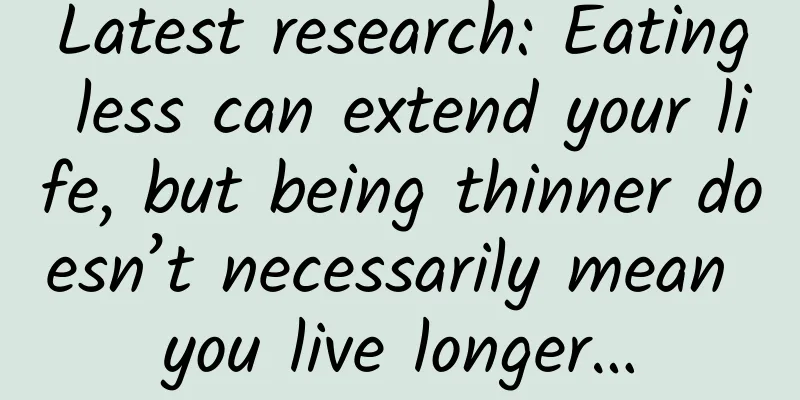Latest research: Eating less can extend your life, but being thinner doesn’t necessarily mean you live longer…

|
A recent study has attracted a lot of attention because it says that reducing food intake by 40% can most effectively extend lifespan. Some friends told me: If you eat so little, you will be really hungry! Should you eat less and go hungry in exchange for a longer life? I said: You may not have read this article carefully, or you may not fully understand the significance of this study. Let me help you interpret it, and you will understand it after reading it. Key Understanding 1 This was an animal study, not a study done in humans. Humans have a very long lifespan, so if we conduct a dietary intervention trial, we have to wait for decades to get the results, which is too difficult. Therefore, nematodes and mice with a relatively short lifespan are often used for research. However, the results obtained from animal experiments cannot be directly used on humans; we can only provide a certain degree of reference or inspiration from them. Moreover, the results of this study are a bit complicated. Eating less can extend life, but being thinner does not necessarily mean living longer. In this study, 960 female mice of different genetic backgrounds were randomly assigned to five groups : (1) a traditional free-feeding group; (2) a group that ate freely at other times but fasted one day per week; (3) a group that fasted for two consecutive days per week; (4) a group with a 20% calorie reduction; and (5) a group with a 40% calorie reduction. The two groups that eat less were fed once every Friday for three days, and then not fed on Saturday and Sunday, and fed again on Monday. In this way, the mice may eat more satiety on Friday, and after eating all the food, they may have to go hungry on Sunday. In fact, it can be regarded as at least one day a week when the food intake is greatly reduced. Starting from 6 months after birth, they eat like this for their entire lives. The researchers found that rats did not eat less food when they fasted one day a week . In other words, the amount of food they did not eat on one day was made up in the other six days. If they fasted for two consecutive days, their food intake would be reduced by about 10%, which is considered "controlling their mouths." Key Understanding 2 For experimental rats, intermittent fasting and calorie restriction can help prevent "middle-aged obesity." In terms of body weight, the body weight of mice that eat freely reaches its peak at 20 months and then decreases after 30 months. It feels a bit like the pattern of human weight changes: you are slim at 20, gain weight in your 40s and 50s, and then slowly lose weight again in old age. In contrast, rats that fasted weekly and reduced their calories by 20% also reached peak weight at 20 months, but were significantly thinner than the free-fed rats. Fasting for two days and reducing calories by 20% had similar effects. This is a bit like people who pay attention to eating only until they are 70% to 80% full at each meal. In this case, they will not gain weight so obviously when they reach middle age. The group that reduced its calorie intake by 40% was in a terrible situation. The weight of the mice kept dropping, starting very quickly and then dropping more slowly, with no peak ever appearing. Maybe it's like a person who is hungry for a long time, always getting thinner and never getting fatter. Key Understanding 3 Eating less can indeed prolong life, but it does not mean that thinner mice live longer. In terms of lifespan, mice with restricted calories do have longer lifespans. Rats with a 40% reduction in calories had a median lifespan of 9 months longer, and a maximum lifespan of about 1 year longer, compared to rats that fasted freely. The median lifespan of fasting mice also increased by about 2 months, but fasting for two consecutive days a week did not seem to be any better than fasting for one day. However, researchers found that rats do not live longer if they are thinner. On the contrary, rats that eat less and are not prone to being too thin live the longest. In other words, under conditions of insufficient food, rats that are good at "saving energy" will live longer; on the contrary, individuals that consume fat and muscle faster after starvation will die earlier. The researchers also found that the life spans of rats with different genetics, even though they ate less, varied greatly. Some rats that ate less did not live longer. Genetics have a big impact on life span . A similar situation exists among humans. "Energy-saving" people can live better in times of poverty and hunger, but are more likely to suffer from obesity and diabetes in a wealthy and well-fed society. After all, during the hundreds of thousands of years of human evolution, food was scarce for most of the time. It would be difficult to change those "thrifty" genes with only a few decades of food abundance. Key Understanding 4 The possible decrease in stress resistance and disease resistance caused by eating less was not shown in this experiment. In these experiments on how to prolong the lifespan of animals by eating less, a key issue is easily overlooked by most readers: the environmental conditions of animal experiments are completely different from the environmental conditions of real human life. The experimental animals live in a stable and comfortable environment arranged by humans, without abnormal weather, large temperature fluctuations, unexpected disasters, or virus harassment. Even if the amount of food is reduced, they will have food on time, and there is no risk of starvation. However, the environment in which humans live is not so stable. We may face sudden drops in temperature, abnormal weather, attacks from various viruses, dangerous pathogens in food, and even various natural and man-made disasters. For example, in recent years, due to the existence of the new coronavirus, life expectancy in many countries and regions has declined, interrupting the trend of rising life expectancy. Even in Hong Kong, a world-renowned longevity region, life expectancy has dropped significantly, and it has recovered in 2023, but has not yet returned to the level before the epidemic. Under these stressful situations, individuals who eat less food on a daily basis will be in great danger due to their poor stress resistance, low immunity and lack of nutritional reserves in the body. Previous studies have found that "minimum nutrition" can significantly reduce the immune capacity of animals. The so-called minimum nutrition is a state that allows people and animals to survive, but the amount of food consumed is significantly less than normal. In plain words, it is barely surviving in a semi-starved state. In this state, there is no ability to fight bacteria and viruses, and it is also impossible to cope with various disasters and adversities. This is just like our lives. Some people live a wealthy life and have some savings. They don't have to worry about money. Even if they encounter various troubles in life, they can rely on their savings to deal with them. Others live a tight life and have no savings. If they have a little disaster or illness, they can't take out money and fall into hardship. Life is hard and stressful. Why do we put our bodies on a tight leash without adequate emergency reserves of energy, protein and various micronutrients? Key Understanding 5 What counts as eating less? It also depends on the amount of exercise and daily living expenses. We have all heard that eating and exercise should be balanced. The so-called "eating less" is not an absolute amount, but depends on the difference between food intake and body consumption. If the body consumes a lot, it may seem that you eat a lot, but in fact you are eating less and dieting. For example, for marathon runners , the daily training pressure is very high. They have to run dozens of kilometers a day, and the energy consumed is more than 1,000 kcal. For them, eating according to the average person's food intake is far from enough, and it will inevitably cause great damage to the body in the long run. On the contrary, those who often sit or lie down every day and do not need to work hard consume much less energy every day. Laboratory animals do not have any mental stress, do not need to study, do not need to work, do not need to work overtime, and do not need to endure various anxiety and depression. Even if the total amount of food is reduced, they can save energy by reducing their activities. There is no need to worry, because food is supplied on time anyway. Humans , on the other hand, face intense learning, work competition, and interpersonal pressure. When we are under stress, our heart rate rises, our blood pressure rises, our muscles tense, and our heart, liver, and kidneys all need to work harder, which means an increase in nutrient consumption. Even in the practice of fasting and eating less in Buddhism and Taoism, it is also necessary to cooperate with measures such as meditation, chanting, and seclusion to reduce physical and mental stress as much as possible and reduce the body's energy and nutrient consumption. Therefore, in the real world, no centenarians have ever achieved longevity by deliberately eating less or creating hunger. Most centenarians have good appetites and strong digestion, but they do not overeat, and the amount and proportion of their food are basically fixed. In short, when we see these research results, we should not rush to apply them mechanically, and we should not form a simple conclusion that "eating less will definitely lead to longer life". It is better to evaluate whether we really eat too much and whether we really need to reduce our food intake . After all, we live in an environment where there are dangers of viral infection everywhere, great physical and mental stress, and we don’t know if we have the gene type that can endure hunger and live a long life. So, if your weight is within the normal range, then eating less is not your main health measure, and increasing exercise to improve body fat percentage may be more important. |
>>: Why do weasels fart? This is their secret weapon
Recommend
Evidence of early human amputation appears here
December 3 is the International Day of Persons wi...
Do you have "bedtime procrastination"? I heard that women are more serious than men!
“Let me check Weibo again, in case there is any e...
Is it true that we cannot use air conditioning all the time in summer?
This year has entered the dog days The dog days w...
Sam Hui and Michael Hui's "Best Partner" series of 4 films (1981-1986) HD collection of Mandarin and Cantonese subtitles
After robbing diamonds from an international crim...
Once a jay hides its food, does it really remember it?
The sower in the forest - Jay The jay belongs to ...
How to quickly increase fans on Kuaishou? What should I pay attention to when increasing followers?
This article mainly introduces how to quickly inc...
Why is Ant Technology’s valuation so high? The basis for Ant Technology’s $200 billion valuation
On July 20, Alipay’s parent company Ant Technolog...
Is the virtual operator behind the 170 failure supported by a “stepmother”?
A few days after the virtual operator (VCOM) relea...
Li Songwei's 21-day training camp makes changes happen steadily and continuously
Li Songwei's 21-day training camp allows chan...
How long will it take for VR to enter its spring?
[[176552]] Overall, the development of the VR sec...
Evaluation of 15 cooking oils: Is the oil you eat every day "really delicious" or "really deadly"?
God! If you find out that the oil you like is pro...
How to tell whether a copy is good or bad? Try matrix analysis
Sometimes we are very confident in our own copywr...
Windows 8/8.1 is growing rapidly: XP is on the way out
According to the latest statistics from market re...
Can pregnant women eat dog meat?
To buy dog meat, please add ❤jimifeng01 Can I e...
There's nothing wrong with mushrooms growing on apples. These foods taste better when they're sick!
Some time ago, a netizen on Xiaohongshu posted a ...









